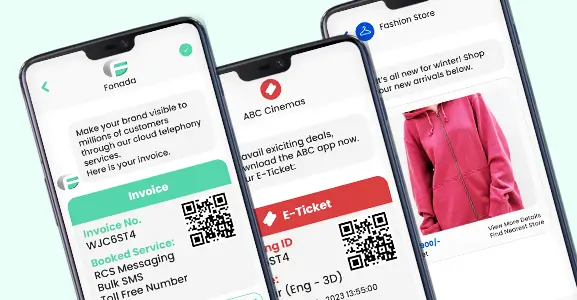What Is PBX Phone System? All Business Owners Need To Know
A private branch exchange, abbreviated as PBX, is a phone system connecting extension phones in one office to the telephone network in another, allowing employees in different locations to communicate. PBX systems offer additional phone features that are not available through regular phone lines, such as enhanced security and conference calling.
PBX telephone systems operate similarly to manual telephone operators, but modern systems are automated and much faster. They also provide advanced calling features such as call waiting, auto-attendants, music/message-on-hold functions, and voicemail.
The best PBX systems benefit businesses with highly mobile employees or sales forces. This guide will provide information on PBX solutions, including the types available, costs, and factors to consider when choosing one.
Read More: A Complete Guide To Phone Number Options In India For Entrepreneurs And Businesses
Introduction (What Is PBX)
A Private Branch Exchange (PBX) is a private telephone network that facilitates communication between end users. The PBX system uses a combination of hardware components to provide connectivity to the telephone network and operates the internal telephone network of a company. It manages the routing of inbound and outbound calls as well as advanced calling features.
However, setting up an office PBX board system is a complex process that requires experienced systems administrators with extensive telecom knowledge. In addition, physical space is needed within the office, such as a closet or server room, to house the PBX box system.
Private Branch Exchange is the full form of PBX for which PBX stands for. Phone systems are crucial for the smooth functioning of businesses, especially those with multiple locations or remote workers. One type of phone system that is gaining popularity among businesses is the PBX phone system.
If you are a business owner, it is essential to understand what a PBX phone system is, its benefits, and how it can help your business. This blog will offer an overview of the question: what is a PBX phone system? Also, know why all business owners need to know about them.
What Is The Difference Between PBX And IP PBX ?

When considering voice communication technology, it is vital to understand the differences between PBX and IP PBX.
What Is An IP PBX Phone System?
A PBX, which is also referred to as a Unified Communications System or a business phone system, serves as the main hub for managing phone calls within a company. IP PBX systems manage internal communication among stations and control communication flow to and from external networks.
What Is Cloud PBX System?
A cloud PBX, also called a hosted or virtual PBX, is a phone system that operates over the internet and is accessed entirely online. In a hosted PBX, all features, services, and applications are provided. Moreover, the software is stored in the cloud instead of on a server.
PBX Vs. Ip PBX
Here are seven key distinctions to keep in mind:
Initial Investment:
PBX systems involve high costs for hardware installations such as KSU, phone handsets, and connecting phone lines. In contrast, IP PBX systems require less physical installations and investment. The focus is mainly on software and internet connectivity.
Quality Of Calls:
PBX call quality depends on hardware quality, while IP PBX call quality can be affected by internet connection quality and network configurations.
Scalability:
IP PBX systems are more scalable than traditional PBX telephone systems. Scaling for IP PBX can be done easily through software upgrades, while PBX requires additional phone lines and hardware installations.
Resilience:
Traditional PBX systems require constant maintenance and can result in costly downtime in the event of technical issues. IP PBX systems are less complicated, require less maintenance and repair work, and may have better uptime.
Mobile Workforce:
IP PBX systems allow mobile workforces to make and receive calls from any device connected to the internet, while PBX requires physical phone connections in the office.
Compliance With Industry Standards:
Traditional PBX telephone systems may not adhere to industry standards, while IP PBX systems are designed to meet compliance standards. IP PBX systems can be easily customized to meet changing needs, while PBX systems may require physical changes.
Cybersecurity Concerns:
Traditional PBX systems have low cybersecurity risks since they are offline and connected by wires. IP PBX systems are exposed to the internet and require firewalls to manage security risks. The quality and efficacy of firewalls are determined by budget and service provider.
Types Of PBX Telephone System
There are four common types of PBX phone systems, each with its advantages and disadvantages. However, in general, best PBX systems are less flexible and scalable equated to VoIP and UCaaS platforms.
Traditional PBX System
The traditional PBX system is a basic physical telephony service that provides incoming and outgoing calls and calls between staff members. It requires expensive upfront costs for equipment and hardware and technicians to wire everything correctly.
IP PBX System
The IP PBX system uses SIP trunking to connect phone systems over the internet, allowing employees to dial in remotely and providing additional features such as messaging and video conference calls. It still requires high upfront costs and technicians to manage IP phones.
Virtual PBX System
The virtual PBX system is an automated answering and call routing service designed for contact centers. However, adding basic functionality would result in extra costs as an additional service like a hosted PBX is needed.
Hosted PBX System
The hosted PBX system is similar to IP PBX but with the provider taking care of software and attributes like conferencing and call forwarding. It is a complete phone solution with equipment hosted off-site and IP technology used to make and receive calls over the internet. However, it is not a proper cloud-based solution and lacks the benefits of a UCaaS platform, such as a business calling app and built-in analytics and reporting.
Read More: Why Is Customer Relationship Key To Grow Business And Build Trust ?
What Is PBX And How It Works?

Private branch exchange is a telephone system used by businesses to switch calls between users on local lines and allow multiple users to share a limited number of external phone lines. Best PBX equipment varies based on the system’s complexity, whether it is a traditional PBX with copper telephone lines, a mix of analog and digital lines, or a VoIP or cloud-based PBX.
Traditional PBX uses copper-based landline phones connected to a box with telephony switches that distribute calls to phones and trunk lines. On the other hand, IP PBX uses digital phone signals and Ethernet cables to connect phones, eliminating the need for rewiring.
IP PBX can also be hosted by service providers, and hosted systems have fewer hardware costs. Virtual PBX offers hosted services with fewer features and is suitable for small businesses. Hosted PBX services are available from various providers, including Fonada.
Reasons To Use PBX
Businesses can enjoy a range of benefits by implementing a PBX phone system, including enhanced connectivity, advanced calling features, and improved security. With a PBX board system, calls can be easily transferred between departments and individuals without having to drop the call first. The system also offers a variety of features beyond voice calls, including online meetings and video conferences.
Customization is another advantage, as businesses can record greeting messages and add music or even custom apps to calls, instant messages, and conferencing across different devices. PBX also allows for communication on the go and can connect multiple business locations using the same system. Additionally, PBX systems now offer built-in encryption to protect conversations and enhance privacy.
PBX systems also offer the ability to manage calls on a specific, pre-programmed schedule, transfer calls with ease, customize greetings, operate call centers, and connect multiple office locations with the same system. Businesses can now configure their PBX as a cloud phone system with managed PBX features across multiple locations and users for maximum flexibility at an affordable price.
Features Of A Hosted PBX

PBX board systems offer unique features that distinguish them from mobile apps and home phones. Here are some of the most valuable features:
- Auto Attendant: An automated attendant directs callers to the right person or department by prompting them to press a specific number.
- Call Forwarding: This allows office phones to forward calls to another number if not answered.
- Call Queues: Calls can be placed in a queue until an available employee is ready to speak with the caller.
- Call Recording: Users can record calls for playback at a later time.
- Call reports provide detailed information on a company’s phone usage, including data broken down by user or department.
- Call Transfer: Employees can transfer calls to their co-workers.
- Extension Dialing: Callers can enter an employee’s extension to reach their direct line.
- On Hold Music: Instead of silence, PBX systems offer businesses the option to play hold music, which can be preselected or custom-made.
- Online Management: Administrators can manage the phone system via an online portal, and employees can access their voicemail and company directory.
- Paging: Employees can send messages to the entire team through a system of speakers or select employee phones.
- Presence: This feature lets employees see whether their co-workers are available or on a call.
- Ring Groups: Employees with similar roles can be placed in a group to assist callers in reaching the appropriate department.
- Voicemail-to-Email: PBX box systems can provide users with an audio file or transcript of voicemail messages sent to their phone.
Read More: How To Improve Sales Performance By Solving Productivity Issues
These features can enhance communication and organization within a business setting.
How Much Does A PBX Cost?
When it comes to choosing a telephony option, cost is the primary concern. With the rise of free or low-cost services like Skype, many organizations are migrating to VoIP to reduce short- and long-term operational costs. Internet telephony services offer immediate savings, as the monthly line rate is lower than traditional TDM systems and includes enhanced features that would otherwise incur additional charges.
VoIP also offers reduced costs for domestic long-distance and international calls, but it is essential to consider the overall cost of migration. While significant cost reductions can be achieved with network convergence, enterprises must also consider possible hidden costs, such as network upgrades to support VoIP on LAN and penalties for ending existing contracts with telephony vendors.
Migrating to VoIP requires expanding network capacity to handle voice traffic and potentially adding SIP trunks. Enterprises must also implement new network management capabilities to prioritize voice traffic and ensure appropriate VoIP security protection. VoIP-specific network infrastructures, such as media gateways and session border controllers, may also be necessary.
Overall, lowering costs can be a compelling reason to switch to VoIP, but it is crucial to consider these factors before making the switch.
Read More: Top Emerging Customer Engagement Marketing Trends For Personalized Messaging
How To Choose The Right PBX Type For Your Business?
When selecting a PBX box system for your business, it is important to start by considering your existing system. For those with an on-premise PBX, investing in a hybrid system can be a good option as it adapts existing hardware to use VoIP, providing better call quality, security, and advanced features. On the other hand, businesses without a phone system should consider a hosted system built for modern work with features for remote work and scalability.
By opting for a hosted or hybrid system with SIP trunking, businesses can reduce telecom costs by up to 60%. VoIP is a modern system that is expected to grow at a compound annual growth rate of 13% through 2031, making it an attractive choice for businesses looking to update their communication systems.
When selecting a VoIP provider, it is essential to consider reliability, cost, security, flexibility, and support factors. Look for a provider that offers 99.99% uptime or better, plans that fit your budget, 24/7/365 monitoring, and certification such as SOC 2 or ISO/IEC 27001. Additionally, consider features like call encryption and softphones for flexibility. It’s also crucial to have a reliable support team in case something goes wrong, and Nextiva is a provider with award-winning customer support and a 94% customer satisfaction rate.
Read More: How To Get The Most Out Of Voice Calling API Service To Empower Your Business ?
Conclusion
PBX phone systems have been essential for businesses for many years, providing a reliable and efficient communication system for internal and external use. PBX allows businesses to establish an in-house communication system for official use. This system assigns phone extensions to each employee and connects all devices within the office to a shared network. Its primary features include call handling, connection management, and call termination.
With the advent of IP PBX, businesses now have more options to choose from based on their specific needs and budgets. Business owners need to consider the advantages and disadvantages of each system before deciding which one to implement. When you need to know what is PBX, professional office PBX solutions providers offer business enterprises of all sizes quality communication service.
Whether looking for a PBX telephone system or a digital one, choosing the right communication technology can help improve business efficiency, productivity, and customer satisfaction.

Dec 11, 2024
Top Contact Center Optimization Tools For 2024
“A thriving business knows how to fetch maximum output from limited resources by optimizing ca... Read More
Nov 13, 2024
What Is Brand Communication? CPaaS Role Explained
Did you ever wonder why some advertisements grab your attention instantly, while others do not? The... Read More
Nov 01, 2024
What Is Automated Messaging And How Does It Work?
Automated messaging or text automation empowers businesses and marketing professionals to connect wi... Read MoreLatest Updates
From Fonada
Industry Insights, Trends, Innovations, Updates, and Case Studies from Industry Experts
View
Customer
Reviews
Discover why our customers love us - read their authentic and heartfelt reviews!
View
Case
Studies
Explore real-life scenarios, offering analysis, and solutions to practical challenges
View
Convert Leads Into Sales With Fonada
Trusted CPaaS Solution Provider








